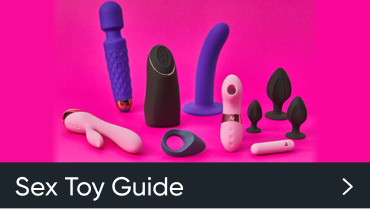Free Shipping over $59
Discreet and fast delivery
Free gift over $75+
Rewards program
Best price guarantee
Can Mental Health Affect Your Sex Drive?

In a word: Yes. And navigating sex is complicated enough without your mental health barging in. For many of us, a healthy sex life is part of good mental health. Sex foster connections, intimacy, and self-esteem, which we love. It boosts your mood, and helps you sleep.
Mental health and sex encompass a huge range of issues. It’s often felt as a lack of desire or interest in sex, as found in cases of depression or anxiety, but it can also manifest in “hypersexuality” – quotation marks deliberate. Keep in mind there’s no “normal” amount of sexual desire or activity. Sex and desire are both reliant on context. If you’re depressed, it’s harder to find joy or pleasure in things. Similarly, if you’re manic, the desire for sex may not go away, which can be intensely stressful or uncomfortable.
As this is a huge topic, I’m not going to cover all things sex and mental health here. What I hope is that we can have a discussion around how we experience desire and pleasure – and how mental health can impact this. If any of this resonates with you, consider seeing a professional. I can only speak from my experience when it comes to the specifics of mental illness, and what’s worked for me may not be right for you.
How Does Your Brain Manage Desire?
When I realised my sex life was starting to feel unbalanced, I found it difficult to pinpoint what was wrong. Sex was still so new and exciting to me, and it already felt overwhelming. Slowly but surely, I’ve learned the ins and outs of how our brains handle desire and pleasure. And now I have a framework to structure my feelings around.
Think of your desire like a car: you’ve got the accelerator and the brakes. This is the dual control model, and it’s one of the ways our brains manage our responses to our environment.
Your accelerator – the sexual excitation system – responds to sex related stimuli, which includes anything your brain has learned to associate with sex. Your brakes – the sexual inhibition system – are triggered when you come up against potential threats, reasons to not be having sex or just not feeling aroused. Just like a car, you’ve also got two brake systems. The pedal brake recognises context, like “we don’t have a condom, we should stop”. The handbrake puts a halt to everything when yanked on by triggers like performance anxiety or trauma.
Understanding your mental health drivers
Getting to know your accelerators and your brakes can help you understand and properly communicate your desire. Now instead of going “Oh my God, I don’t want to have sex with my partner even when [insert sexy scenario here], there’s something wrong with me”, I can think “Oh, I’m actually really anxious about work today and that’s putting the brakes on feeling sexy right now”.
Everyone’s list of accelerators and brakes will be different. After all, they’re things we pick up as we go along. These are only the very basics of the dual control model, which I learned from Emily Nagoski’s book Come As You Are. It’s genuinely changed the way I think about stress and desire, and it’s almost become by bible on the topic. Seriously, I can’t recommend it more.
Your desires will change as you do
I spent a lot of my teenage years with an incredibly sensitive accelerator. Anything and everything turned me on: pretty hands, intimidating women, Mr. Darcy’s love confession in Pride and Prejudice – the Keira Knightly one, obviously. As I got older and my mental health changed and I found myself slamming the pedal brake constantly. It made me so confused. I still felt so much desire, why wasn’t pleasure as easy as it used to be?
As I’m entering my mid-twenties, I’m learning how to balance a sensitive accelerator with sensitive breaks. Essentially, I’m careening wildly into any and all sexual experiences with the handbrake on, which is making a horrible scraping sound and distracting me from feeling any pleasure in my body at all, but more on that later.
It’s All About Context
I mentioned context briefly before, but we’re about to get into the nitty gritty of it all right now. Context is vital when it comes to understanding desire. When I say context, I don’t only mean situations- who you’re with, where you are etc.- but what your brain is doing. When my OCD is bad, there’s no way I’m having sex because I don’t want my compulsions to kick in halfway through.
Picture this: you had a nightmare day at work. You didn’t have time for lunch. You’re soaked from the rain and your bus was late. By the time you get home, you’re starving, exhausted, and ready for the day to just be over already. So when your partner starts kissing your neck while you’re watching Killing Eve that evening, sex is literally the last thing you feel like.
But let’s say your day was different. You ate some yummy birthday cake, cancelled a pointless meeting, and a really cute baby gave you a huge gummy smile on your commute home. That evening your partner starts kissing your neck and it feels really good and oh, Killing Eve is actually quite a sexy TV show, isn’t it? Instead of going to bed, you have a quickie on the couch like teenagers and you both start giggling at the end and can’t stop.
See? Same partner, same neck kisses, completely different contexts.
If you’re depressed and struggling to find pleasure in your daily life, you’re going to have a hard time finding it in sex. Similarly, if you hate yourself or hate your body, it won’t be easy letting someone else love it. When your brain is stressed, you consider almost everything as a potential threat.
Your context is also informed by your life experiences. Think past relationships, trauma, sexual violence. Something that you used to enjoy or feel neutral about now triggers that fight, flight or freeze response. Bodies do seemingly strange things in response to trauma. Sometimes your brain can’t leave the trauma alone, like scratching off a scab even when you know it’s going to scar.
Mental Health, Sex, and Medication
I’ve been on medication to help manage my mental health for about a third of my life. I’ve mostly been on SSRIs (selective serotonin reuptake inhibitors), although I’ve been prescribed a sexy little antipsychotic every now and then. SSRIs are notorious for messing with your sex life. They can massively change the way you experience desire and arousal. Some people find that they can’t orgasm at all while on them. This is because the increase in serotonin can impact your neurotransmitter and hormone levels, such as dopamine and testosterone. Both play a role in facilitating sexual function, and changing them will change your sexual experience.
It hasn’t always been easy balancing my sex life with SSRIs. There have been times when sex was more stress than it was worth. I’d be anxious before sex, during sex, and after sex, so it was easier to just stop having sex altogether (more on the time I fell into a deep pit of despair over my sex life here). Each time I thought I might be in the headspace to try having sex, I’d put too much pressure on myself, and the cycle would start all over again. That’s context again for you.
Reminder: your body is functioning normally
Many people refer to the sexual side effects of SSRIs as “sexual dysfunction”. I think that’s a relatively useless term. Could there be some scenarios where it applies? Yeah, sure, but this is not one of them. Slapping “dysfunction” on the completely normal highs and lows of your sex life carries unhelpful connotations. You’re mentally ill. Not dysfunctional. It’s not fair to label a natural bodily response as a ‘dysfunction’.
If SSRIs are impacting your ability to have the sex life you want, there are a few tricks you can try. Your psychiatrist or GP (whoever prescribed you your medication) should be your first point of contact. If you’re in a stable enough place to fiddle with your brain chemistry, they might try lowering your dose or changing you to a medication with fewer side effects. It might feel weird if sex isn’t something you’ve talked about before, but you’re both adults. This is part of their job. You can do it.
Getting Mindful
If, like me, changing medication doesn’t make a difference, it’s time to get mindful. I used to manage my anxiety by distancing myself from my body. As it turns out, that’s not great when you’re trying to experience pleasure. Masturbation can help as it gives you a chance to practice just being in your body, and it’s a relationship we often overlook. My sexual relationship with myself is one my most important relationships. And that’s true whether or not I’m having partnered sex. My top tip? Masturbate with the intent of getting to know yourself, of experiencing how different touch feels, not just to orgasm.
Sometimes you don’t want to be in your body. Sometimes being in your body is making you feel worse at the moment, and that’s okay too.

Seek professional mental health help
You may also want to see a sex therapist. We don’t talk about sex enough! Having a structured conversation with an expert can work wonders, and it’s a good way to remind yourself that you’re not alone. Whatever you’re facing, whatever huge hang-ups and traumas you have around sex, someone has been through it before. A sex therapist can guide you through it and help your heart feel a little less heavy.
You might also benefit from sexological bodywork. While it includes aspects of talk-based therapy, there’s a heavy focus on the body, including addressing the emotions and feelings you’re carrying in your muscles and nervous system. Sexological bodyworkers help you learn about the specifics of your body. Some may also offer one way touch, where they can help you explore sensations in your body through practices like genital and body mapping. Iy can be incredibly helpful if you’re comfortable with erotic touch, and the practitioners are highly trained practitioners with strict ethics code.
Give Yourself a Break from Sex
If all else fails and things are just not clicking, it may be time to just let yourself have a break. Give yourself the opportunity to not have sex for a while.
I know, accepting that maybe sex just isn’t your body’s top priority for a bit can be difficult, but sometimes you really need the space to just exist, without putting so much pressure on yourself. I was entering every single sexual experience and hoping that maybe this time, this particular set of circumstances would be what I needed to fix everything. It was exhausting and just made pleasure and sex so difficult to relax into.
Taking a break was one of the best things I ever did for my sex life. It helped me get out of that cycle of high expectations and disappointing experiences.
I also found that I suddenly had all this space and time to learn more about the way desire and pleasure work in my body. I read books about the science of sex, listened to podcasts, read erotica, saw a sex therapist. For the first time in months, it made me feel like I had control over my sex life again.
It may feel overwhelming, but it won’t feel like that forever. If you’re going through a rough patch, it’s normal to find getting aroused or orgasm difficult. And there are so many different ways through it. Be patient with your mind and your body and know that whatever decision you make, it’s the right one for you.











